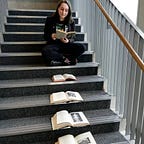Your Partner Might be a Sign of Healing
Because it takes a great deal of self-love to let good people in your life
Our history of relations is a forever-updating database of how we connect to others, whether they are friends, family, or partners. Most importantly, though, all these connections are proof of how we connect to ourselves: what we want, what we think we deserve, how we see ourselves.
Then why do we tend to overlook this aspect?
The answer, in my case, arrived after a long process of looking back to my past partners…and looking at who’s by my side now.
Growing up, I had my fair share of friends and partners. Needless to say, most of them didn’t work in the long run.
For what concerns my romantic partners, that’s a particularly dire one: not a single one of them lasted, even the few ones I had invested in not only emotionally, but in terms of future projects.
With the power of hindsight, new clues and realisations were available to me — way more than when I was in the thing.
Yet, while I was ‘in the thing’ some behaviours seemed perfectly normal: I was okay with the unregulated jealousy. I was okay with the lying and, most of the time, I would repay them the same way. I was okay with those weird transitioning moments of apathy, and with giving too much without expecting — and receiving — anything in exchange.
One, in particular, comes to my mind: I used to commute three times a month a distance of 500 miles to see my long-distance partner. Plus, I did that on a high-school student budget. It was tough, but I did it. And I did it again, and again…and again. It was for the sake of seeing her, of spending time with her, of being together.
It seemed perfectly normal to the younger me back then, for example, that she never took the same train to visit me.
You might have seen it coming faster than I did: she wasn’t the right person. Many people weren’t the right people for me. And they weren’t not because they were mass murderers, or bank robbers, or Jeff Bezos, but because I, too, wasn’t the right person for me.
Analysing my past relationships’ dynamics, it was clear that many times I excluded myself from the equation. That, if you ask present-day me, is an indicator big enough to look in the rear mirror and reverse at the speed of light.
Then why did I pick those people? Why did I make those connections? Was I completely out of my mind?
I like to think that I wasn’t. The truth, plain and simple, is that I just didn’t care about myself. I didn’t like myself at the least. In a way, you could say I was, if not prone, indifferent to self-destruction.
Why and how do we choose people? That’s a wildly broad question, and I don’t think it accommodates one single answer. Yet, whichever goes on in our mind and body when we pick people, it tells us a lot about what we want for ourselves, what we think we deserve.
I see it now. I’ve subscribed to a deep-rooted lack of self-love for the entirety of my teens and until the brink of my twenties. My choices in human connections displayed that.
Whatever was the ‘criteria’ in letting those people in my life, it was based on the assumption that I didn’t love myself in a healthy and positive way, so I wasn’t expecting them to give me that kind of love.
The truth is: we all deserve that kind of love — the kind that’s charged in positivity, and allows us to take each step in a healthy way.
With my life, I am interested in uniting the dots and tracing the changes from back then. I don’t think my change in attitude happened overnight, but it was clear when it was happening because I looked at the person next to me and thought: right. This is right.
This is a good person. They’re not perfect, far from it, but they are right. They do things for me and those things, those promises, and gestures and commitments show me how ready I am to accept them now.
There’s no other way to put it: it takes self-love to choose truly good people in our lives.
It is a notion easy to overlook. In all honesty, I wish someone had told me this while growing up.
Would I have chosen different people? Probably not. Would I have healed faster? Who knows. Would it have planted something in me, the desire for something different? Yes. I’m sure of that.
What we label as self-love, or self-acceptance, or whatever nuance of it, is a never-ending route. It’s the longest of processes because it stops when our life does.
It’s important, though, that we assess what is around us, what goes on in our lives, and who we let in, to understand the way our own progress is going. It is more than important: it’s vital.
Picking someone that works for us, someone good and healthy for ourselves, is already a big sign of self-improvement and self-love. In allowing that person to treat you well, you are saying: yes, I deserve to be treated well. I deserve healthy emotions. I deserve love.
N: in this piece, I use ‘healing’ referring to issues of self-acceptance and self-love, and ‘partner’ as a non-gendered, constant emotional and/or romantic relationships.
